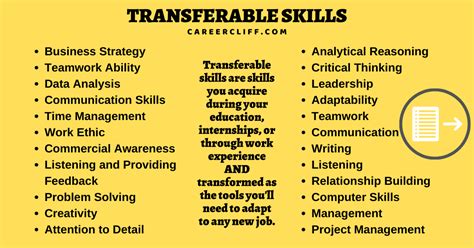Transferable skills are a set of skills that can be applied across different industries, jobs, and contexts. These skills are highly valued by employers because they can be used to solve problems, communicate effectively, and work efficiently in a variety of settings. Transferable skills can be developed through various experiences, including education, work, volunteerism, and personal projects. They are essential for career advancement, job searching, and professional development.
Transferable skills can be categorized into several groups, including communication skills, problem-solving skills, leadership skills, and time management skills. Communication skills, such as public speaking, writing, and negotiation, are essential for conveying ideas, building relationships, and resolving conflicts. Problem-solving skills, such as analysis, critical thinking, and creativity, are necessary for identifying and addressing challenges, making informed decisions, and developing innovative solutions. Leadership skills, such as strategic planning, team management, and coaching, are vital for guiding teams, motivating employees, and driving organizational success. Time management skills, such as prioritization, organization, and adaptability, are crucial for managing multiple tasks, meeting deadlines, and responding to changing circumstances.
Key Points
- Transferable skills are applicable across different industries, jobs, and contexts
- They can be developed through various experiences, including education, work, volunteerism, and personal projects
- Transferable skills include communication, problem-solving, leadership, and time management skills
- These skills are highly valued by employers for their ability to solve problems, communicate effectively, and work efficiently
- Transferable skills are essential for career advancement, job searching, and professional development
Types of Transferable Skills

There are several types of transferable skills that are highly valued by employers. Some of the most common types of transferable skills include:
Communication Skills
Communication skills are essential for conveying ideas, building relationships, and resolving conflicts. They include public speaking, writing, negotiation, and interpersonal communication. Effective communication skills can help individuals to express themselves clearly, listen actively, and respond appropriately to different situations.
Problem-Solving Skills
Problem-solving skills are necessary for identifying and addressing challenges, making informed decisions, and developing innovative solutions. They include analysis, critical thinking, creativity, and decision-making. Individuals with strong problem-solving skills can analyze complex problems, evaluate different options, and implement effective solutions.
Leadership Skills
Leadership skills are vital for guiding teams, motivating employees, and driving organizational success. They include strategic planning, team management, coaching, and mentoring. Effective leaders can inspire and motivate others, build strong relationships, and drive results-oriented performance.
Time Management Skills
Time management skills are crucial for managing multiple tasks, meeting deadlines, and responding to changing circumstances. They include prioritization, organization, adaptability, and self-discipline. Individuals with strong time management skills can prioritize tasks effectively, manage their time efficiently, and achieve their goals.
| Transferable Skill | Definition | Example |
|---|---|---|
| Communication | Conveying ideas and information effectively | Public speaking, writing, negotiation |
| Problem-Solving | Identifying and addressing challenges | Analysis, critical thinking, creativity |
| Leadership | Guiding teams and driving organizational success | Strategic planning, team management, coaching |
| Time Management | Managing multiple tasks and meeting deadlines | Prioritization, organization, adaptability |

Developing Transferable Skills

Developing transferable skills requires a combination of education, training, and experience. Individuals can develop transferable skills by:
Seeking Out New Experiences
Seeking out new experiences, such as internships, volunteer work, or personal projects, can help individuals develop transferable skills. These experiences can provide opportunities to apply skills in different contexts, receive feedback, and build a portfolio of accomplishments.
Receiving Feedback and Coaching
Receiving feedback and coaching from others can help individuals identify areas for improvement and develop transferable skills. Feedback and coaching can provide insights into strengths and weaknesses, help individuals set goals, and develop strategies for improvement.
Practicing Reflection and Self-Assessment
Practicing reflection and self-assessment can help individuals develop transferable skills by identifying areas for improvement and tracking progress. Reflection and self-assessment can help individuals set goals, develop strategies, and evaluate the effectiveness of their efforts.
What are transferable skills, and why are they important?
+Transferable skills are a set of skills that can be applied across different industries, jobs, and contexts. They are important because they can be used to solve problems, communicate effectively, and work efficiently in a variety of settings.
How can I develop transferable skills?
+Transferable skills can be developed through various experiences, including education, work, volunteerism, and personal projects. Seeking out new experiences, receiving feedback and coaching, and practicing reflection and self-assessment can help individuals develop transferable skills.
What are some examples of transferable skills?
+Examples of transferable skills include communication, problem-solving, leadership, and time management skills. These skills can be applied across different industries, jobs, and contexts, and are highly valued by employers.
In conclusion, transferable skills are a set of skills that can be applied across different industries, jobs, and contexts. They are essential for career advancement, job searching, and professional development. By developing transferable skills, individuals can demonstrate their value and versatility to potential employers, and increase their chances of success in a rapidly changing job market.

